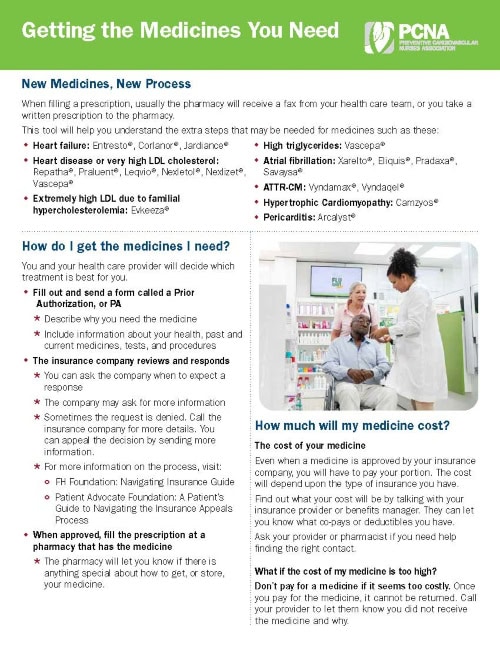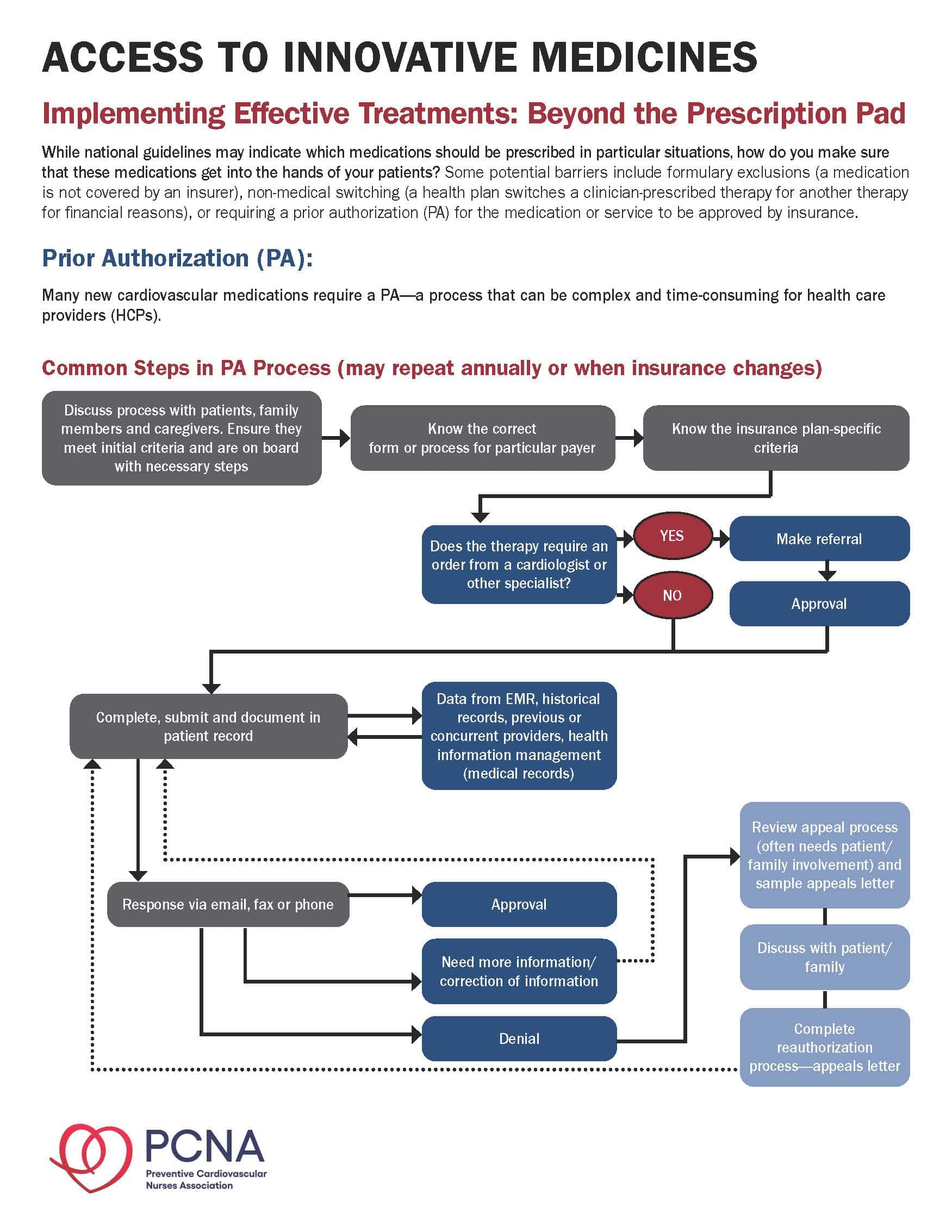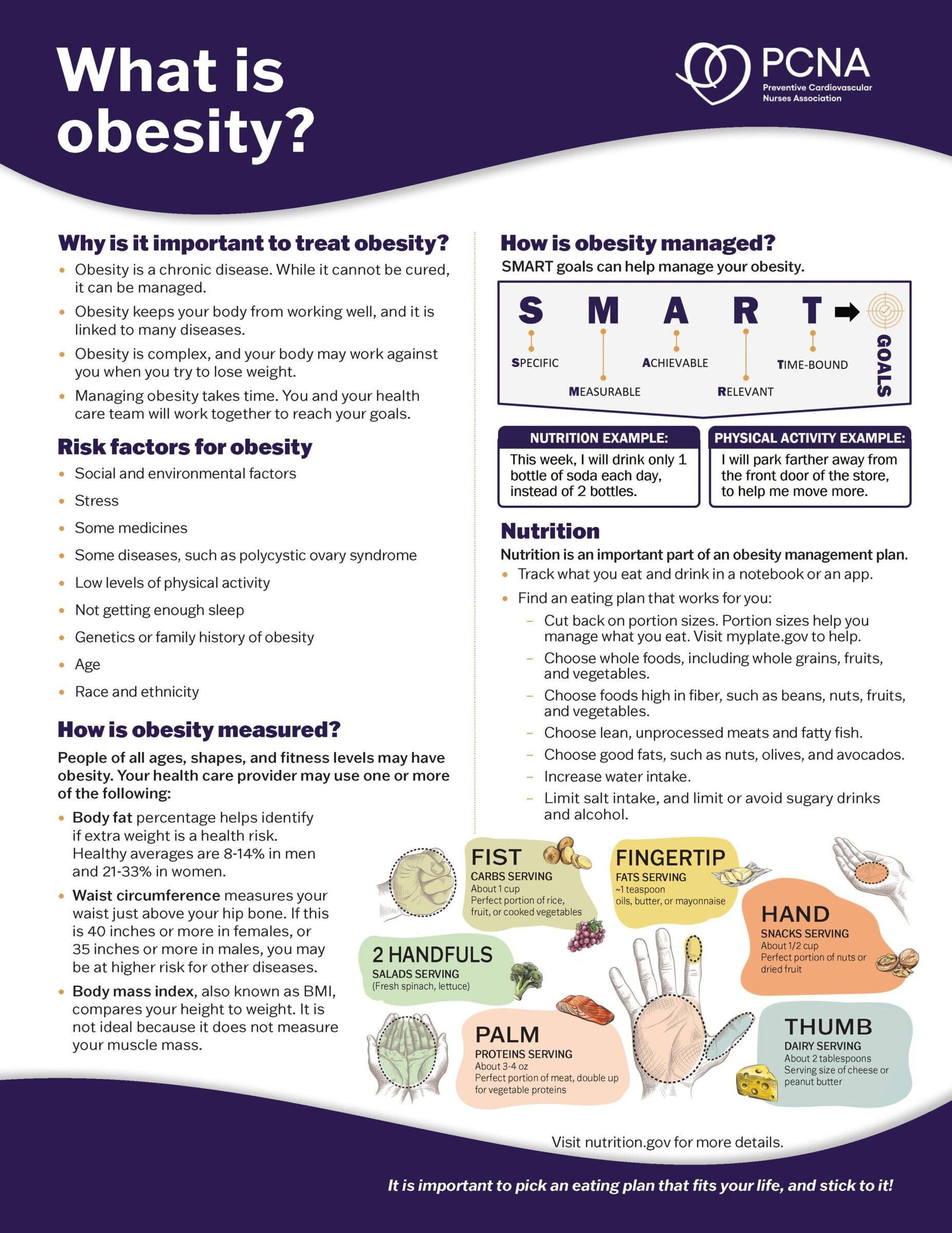Treatment for obesity has been all over the news recently, and as cardiovascular healthcare professionals, we know the negative effects obesity can have on cardiovascular outcomes.
But are these groundbreaking treatments accessible to our patients? Join Kathryn Schubert, CEO of the Society for Women’s Health Research, and learn about the Treat and Reduce Obesity Act and its benefits to the cardiovascular community.
Episode Resources
- Society for Women’s Research: Women’s Health Perspectives
- Congress.gov
- Empowering Women Living with Obesity: A Review of the Insurance Landscape, Resources, and Helpful Information Webinar
- Spotlighting the VA MOVE! Program’s Approach to Weight Management Webinar
- Exploring Obesity’s Impact on Women and Policy’s Role in Improving Outcomes Webinar
- Obesity Disparities in Women and Factors Impacting Health Outcomes Fact Sheet
- PCNA Obesity Patient Education Tool
- PCNA Advocacy Training Course – From Care to Action: Basics of Advocacy
Geralyn Warfield (00:20)
Welcome to today’s episode, the second of a four-part mini-series that explores advocacy in nursing. Our previous episode included a discussion about what advocacy in nursing might look like and how nurses can take small steps that can make a very big difference. Today I’m pleased to be joined by Kathryn Schubert to continue our conversation. Kathryn, could you introduce yourself to our audience, please?
Kathryn Schubert | SWHR (00:43)
Sure, so it’s nice to be here. My name is Kathryn Schubert. I’m president and CEO of the Society for Women’s Health Research, which is a national thought leader dedicated to advancing women’s health through science, policy, and education. But we also promote research on sex differences and disease to optimize women’s health.
Geralyn Warfield (01:01)
Well, we have a lot to talk about when it comes to advocacy and I’m really grateful to you for spending time with us today. I’m sure this is going to be a great conversation that our audience is going to take away a lot of information. And let’s go ahead and just dive in about the Treat and Reduce Obesity Act, which is also known as TROA. Can you explain what this bill is and why your organization is in support of it?
Kathryn Schubert | SWHR (01:24)
Absolutely. So TROA and yes, we love our acronyms here in DC. So, we’re delighted to have a new acronym for the Treat and Reduce Obesity Act here, but it’s a bipartisan bill which is rare these days in Washington, DC to see, but it would expand Medicare coverage to include screening and treatment of obesity.
And this is really across the spectrum. It includes medication, lifestyle change, surgery. And it really, I think, targets populations as we’re seeing the obesity rates continue to rise in this country and really ensure that those Medicare beneficiaries have access to the full spectrum of obesity care. So, we are excited to be supportive of this legislation. Both the House of Representatives and the Senate have introduced it. It is making its way through Congress, and we’re hoping that we’ll see it pass at the end of this year, as Congress is finishing its session.
But if for some reason it doesn’t, we’ll continue our advocacy. I think that’s where all of the
healthcare professionals can help all of us to make sure that we’re getting as much done to reduce and treat obesity as possible, given the interconnectedness of chronic conditions and for us at the society, its impact on women.
Geralyn Warfield (02:40)
I really appreciate the fact that you are looking at this from both sides of the aisle. And then from both sides of what obesity is, in and of itself, but all the comorbid conditions that are impacted by obesity and then also impact obesity themselves. One of those being cardiovascular disease. So why is this TROA Act important for those of us that deal with patients that are either at risk for or are actually in the throes of having cardiovascular disease?
Kathryn Schubert | SWHR (03:11)
Cardiovascular disease is still the number one killer of women in this country, which I think sometimes we forget. So, I think that’s a really important point for all of us to just keep in mind as we think about how we can address that public health issue. One of those ways is through the treatment and reduction of obesity. We have seen that with appropriate access to treatment and care, appropriate counseling, and appropriate medication or surgery that folks who are at higher risk of cardiovascular disease can prevent cardiovascular episodes.
And so, when we think about its impact on women in particular, of course, that’s what we’re looking at, at the society, but we feel like we can really address a lot of these chronic conditions that we’re seeing in women, particularly as we age, we want to age as well as possible and make sure that we’re healthy leading into this really important time of our lives. In the US, when you hit 65 years of age, you are eligible for Medicare. And the reality is that we can’t treat the obesity once you hit Medicare age, at the moment, because it’s something that Congress has to change. We can treat cardiovascular disease, diabetes, hypertension, et cetera. But if we can start earlier and we can prevent obesity, we can tackle these chronic conditions even better than we are now.
Geralyn Warfield (04:32)
I suspect our audience has heard a lot of information lately in whatever media they listen to or watch in terms of obesity. It seems to be on the front of everybody’s minds. But also at the same time, based on the time of year that we are at, there is an election that is happening. And I’m wondering how this current election is affecting the possibility of passing the TROA Act. Do you see any big changes in the bills, perhaps post-election?
Kathryn Schubert | SWHR (05:01)
That’s a really good question. And I think it’s really important too, as folks are entering this election season. So, one of the things that we have is a Get Out the Vote campaign actually related to research in women’s health. So, one of the things that I would definitely encourage the audience to do is ask anyone who’s running for office where they stand on these issues. You can ask them if they’re a co-sponsor of the legislation. You can ask them if they are willing to vote for the legislation once they come into office or if they’re still there, you know, once the election is over.
I think at a broader scale, we will likely see a scaling back of the provisions within the legislation. And what that means is Congress always has to find ways to pay for whatever legislation they’re trying to pass, particularly at the end of the year. They’re looking right now for cost savings in a variety of areas, and they’re also looking at bills as what they would call spenders.
TROA right now, unfortunately, is a spender because of the way that Congress looks at how we’re saving money. The cost savings we would expect to see from that prevention and treatment of other chronic conditions is not inside their budget window. So that is a challenge, I think, in terms of getting something passed. However, there’s lots of support for moving something forward.
The House Ways and Means Committee, which oversees Medicare, as does another committee on the House side, but they have not yet taken it up, but the Ways and Means Committee took up this bill. They scaled it back quite a bit, but I do think from an advocacy perspective, we’d love to see anything move toward the end of the year. And so, we won’t really know exactly what it is that Congress is looking to do until after the election. They’ll come back for a few weeks, hopefully pass a large package of bills that includes TROA, and then we can rebuild, right? We can build on whatever is passed.
Right now, the immediate goal is to try to get some sort of Medicare coverage for obesity treatment so that we can then continue to build on that option in the future.
Geralyn Warfield (07:08)
We are going to take a quick break, and we will be back speaking with Kathryn about the TROA Act.
We’d like to welcome our audience back to our conversation with Kathryn Schubert about the Treat and Reduce Obesity Act, also known as TROA, and its implications for our patients with obesity and cardiovascular disease. I’m hoping you could spend just a little bit of time, Kathryn, talking about what really will TROA do for our patients.
Kathryn Schubert | SWHR (07:33)
Absolutely. So currently in the line of thinking, if you are a Medicare beneficiary over the age of 65 enrolled in the Medicare program in this country, you do not have access to any obesity care. So that’s not just GLP-1s, which I think is sort of the new fashion, right? The new opportunity, innovative medication that will help with treating obesity, but you also don’t necessarily have access to surgery, lifestyle interventions, nutrition services. And so, what this would do is recognize that Medicare can offer coverage of the full spectrum of obesity care, whether that is nutritional, whether that is lifestyle changes or GLP-1s or surgery.
The reason that we have to have a legislative change and the reason why we have to have this bill passed is because there was a carve out many years ago for what Congress considered quote unquote weight loss management. They did not recognize obesity as a chronic condition. I think there’s a lot that we have been changing in this society and this country and thinking about how we talk about obesity and how we address it and the stigma associated with it. But the reality is it’s a chronic disease. It should be treated, and we have to recognize that.
And so unfortunately, Congress has to get involved in this because they set up this problem for themselves, but we are really hoping that with this change in recognition, we’ll be able to make change, not just in the coverage and access side, but also how we’re approaching our health, how we’re approaching obesity as a chronic condition and all of the associated comorbidities. And so, we really hope that it will make some improvements there.
Geralyn Warfield (09:20)
Is there anything specific related to women’s health with which I know your organization is very focused that the TROA Act might focus on and allow us to help those patients even more?
Kathryn Schubert | SWHR (09:31)
Absolutely. So, one of the things to keep in mind is related to that stigma that I just mentioned. In women’s health across the board, we see stigma associated with any condition that you can think of, whether it’s something having to do with gynecological health, like endometriosis or fibroids, all the way up to obesity. I mentioned heart disease being the number one killer, but in obesity, the stigma associated for women in particular, I think really puts us at a disadvantage.
We are told that weight loss is something that we have the power to achieve on our own if we just tried hard enough. It does not take into account risk factors, including metabolic issues that you might have, which we know women may have more of, or they may show up differently because of our hormones. We may have issues like polycystic ovary syndrome, which is associated with weight gain. We may have issues through the menopause transition where we’re gaining weight and have made zero changes to our lifestyle or our diet.
And so, I think the stigma piece for women is really important.
The other thing to keep in mind is that about a quarter of the women in the United States are overweight. We don’t know sort of what is attributing to that in addition to our sort of gaining of chronic conditions and multi morbidities in this country. So, you don’t probably aren’t just living with obesity, you’re probably also living at greater risk of diabetes or heart disease, or you are diabetic and you do have hypertension.
And so, thinking about that too, I mentioned midlife for women in particular, we gain an average of one and a half pounds per year during midlife. And so that’s really starting in your mid-thirties. And so, you can imagine by the time you get to Medicare age, that weight gain is steady and consistent if it’s not treated and you’re not looking at your blood work for chronic conditions. We also know that there’s social issues that we see associated with this. So, when we look at women in the workforce, so pre-Medicare, but leading into that age, women between the ages of 51 and 61 who are living with moderate to severe obesity have a 40% lower financial net worth than that of their peers.
So, this is a full spectrum issue for women, both in terms of their health and outcomes and how well they’re aging and living, but also how are we contributing to the economy? How productive are we going into those years? What sort of financial nest might we be able to build going into that time when you will be retired and hopefully wanting to go out and do a bunch of things, right? You want to make sure that you’re addressing this in a whole person approach.
I would say there’s not necessarily a difference in terms of rates of obesity for men versus women, but I do think that the societal stigma issues are stronger for women than there are men.
Geralyn Warfield (12:32)
Kathryn, you have given us a lot to think about and a lot to act upon, but is there one key takeaway that you would like to leave with our audience?
Kathryn Schubert | SWHR (12:41)
Yes, when it comes to advocacy, and I should say too, my mom is a nurse by training, so come from a strong background of nurse advocates. You should definitely reach out to your member of Congress and tell them to get TROA across the finish line. Ask them to pass it. You can easily find who your member of Congress is if you don’t know on congress.gov. You can write them an email. You could @ them on social media. They are looking at that all the time.
But really making your voice heard and to offer yourself up as a resource so that you can be that healthcare expert for them when they’re hearing real stories about the impact of these policies on your patients, on your practice of medicine. I think that that’s really critical to keep in mind. So just encourage everyone to be an advocate.
Geralyn Warfield (13:34)
Kathryn, thank you so very much for sharing your expertise and your excitement about being involved in this process and helping our patients both in the short as well as the long term so that we can have improved patient outcomes for all of our patients, but particularly for those women who might not otherwise have this opportunity.
I’d also like to remind our audience that this is part of a four-part mini-series of podcast episodes. You can catch those other episodes online or wherever you catch your podcasts. And also, we will have those references that Kathryn spoke about earlier in the show notes. So, you can certainly reference those for how to act and how to make a difference.
I’d also like to thank Amgen, Bristol Myers Squibb, Novartis and Novo Nordisk for their unrestricted grant funding for PCNA’s advocacy efforts. This is your host, Geralyn Warfield, and we will see you next time.
Topics
- Advocacy
- Obesity Management
Published on
November 5, 2024
Listen on:
Related Resources









